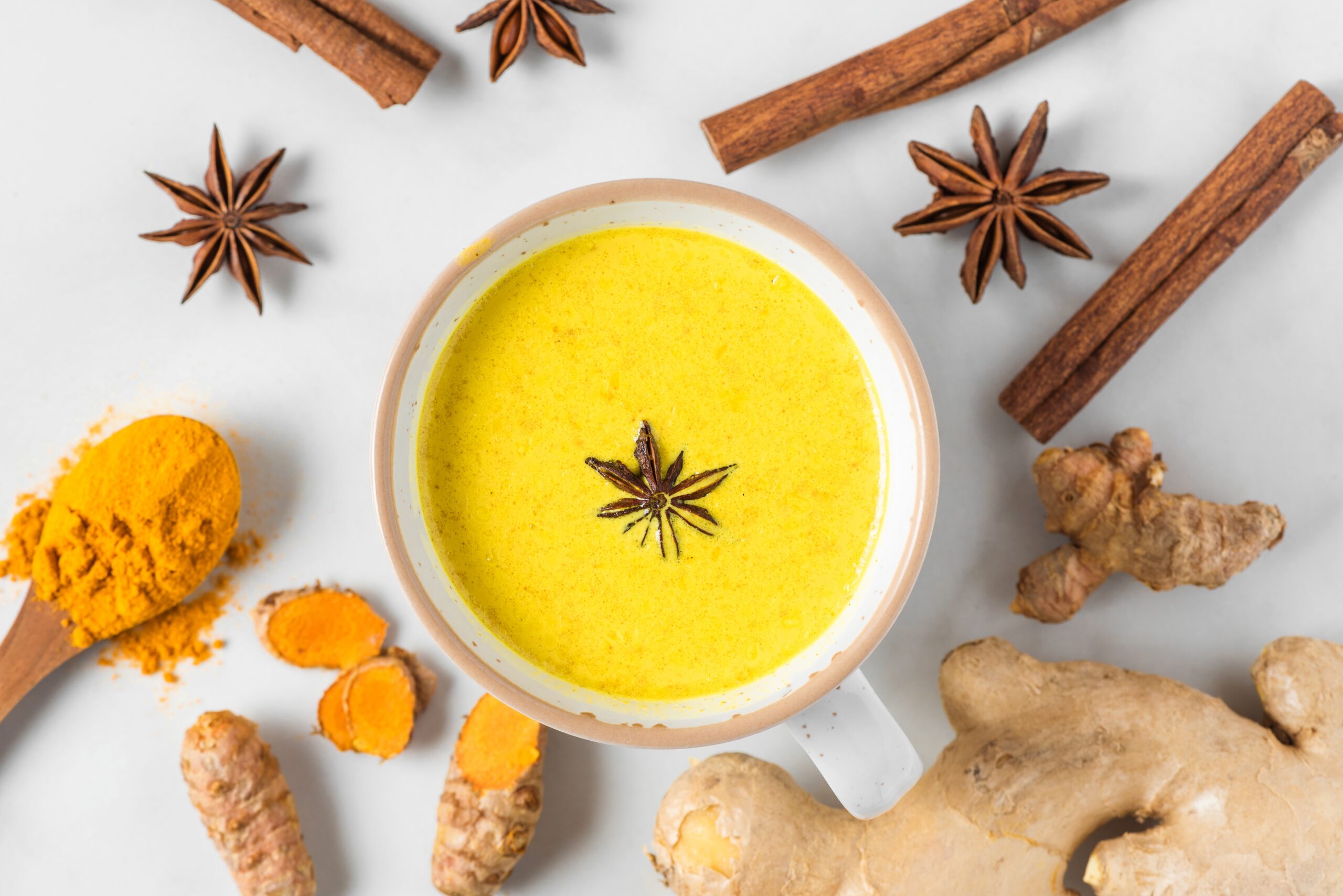
Another Ayurvedic favorite of mine and one I often suggest to my clients when they are fatigued. A warming, comforting drink whose main ingredient is turmeric and has been used in both Ayurveda and Traditional Chinese Medicine as an anti-inflammatory, to treat digestive and liver problems, fatigue, insomnia, and skin diseases.
Golden milk is great for calming Vata, which has a tendency to go out of balance during the winter and fall months. This drink calms the mind and is healing to the body. With all of the heating spices added, Golden Milk is a great way to increase the digestion and the circulation. Other health properties of this drink include: strengthens the bones, beneficial to anemia, increases ojas (immunity and vitality), cleanses the blood and beautifies the complexion. Its main spice, turmeric is bitter, astringent and pungent in taste. Turmeric contains balancing qualities for all three doshas: its “hotness” balances Vata and Kapha; its dryness and its pungent and bitter tastes balance Kapha; and its bitter taste also balances Pitta; making it tri-doshic! Turmeric has many positive benefits: it supports detoxification for the liver; promotes a healthy response to allergens and a healthy immune response; assists digestion; helps purify the blood; and promotes health of the lungs, circulation and nervous system.
Turmeric, is related to ginger, and is used as a dietary supplement for inflammation; arthritis; stomach, skin, liver, and gallbladder problems; cancer; and other conditions.Its primary active ingredients, curcuminoids, is used to color foods and cosmetics. Curcumin is also a powerful antioxidant. Antioxidants scavenge molecules in the body known as free radicals, which damage cell membranes, tamper with DNA, and even cause cell death. Antioxidants can fight free radicals and may reduce or even help prevent some of the damage they cause.
In addition, curcumin lowers the levels of two enzymes in the body that cause inflammation. It also stops platelets from clumping together to form blood clots.
The University of Maryland Medical Center reports on their website that research suggests that turmeric may be helpful for the following conditions:
Curcumin stimulates the gallbladder to produce bile, which some people think may help improve digestion. The German Commission E, which determines which herbs can be safely prescribed in Germany, has approved turmeric for digestive problems. And one double-blind, placebo-controlled study found that turmeric reduced symptoms of bloating and gas in people suffering from indigestion.
Turmeric may help people with ulcerative colitis stay in remission. Ulcerative colitis is a chronic disease of the digestive tract where symptoms tend to come and go. In one double-blind, placebo-controlled study, people whose ulcerative colitis was in remission took either curcumin or placebo, along with conventional medical treatment, for 6 months. Those who took curcumin had a significantly lower relapse rate than those who took placebo.
Because of turmeric’s ability to reduce inflammation, researchers have wondered if it may help relieve osteoarthritis pain. One study found that people using an Ayurvedic formula of herbs and minerals with turmeric, winter cherry (Withinia somnifera), boswellia (Boswellia serrata), and zinc had less pain and disability. But it’s impossible to know whether turmeric, one of the other supplements, or all of them together, was responsible for the effects.
Early studies suggested that turmeric may help prevent atherosclerosis, the buildup of plaque that can block arteries and lead to heart attack or stroke. In animal studies, an extract of turmeric lowered cholesterol levels and kept LDL (bad) cholesterol from building up in blood vessels. Because it stops platelets from clumping together, turmeric may also prevent blood clots from building up along the walls of arteries. But a double-blind, placebo-controlled study found that taking curcumin, the active ingredient in turmeric, at a dose of up to 4 g per day did not improve cholesterol levels.
There has been a great deal of research on turmeric’s anti-cancer properties, but results are still very preliminary. Evidence from test tube and animal studies suggests that curcumin may help prevent or treat several types of cancers, including prostate, breast, skin, and colon cancer. Tumeric’s preventive effects may relate to its antioxidant properties, which protect cells from damage. More research is needed.
Test tube and animal studies suggest turmeric may kill bacteria and viruses, but researchers don’t know whether it would work in people.
A preliminary study suggests curcumin may help treat uveitis, an inflammation of the eye’s iris. Preliminary research suggests that curcumin may be as effective as corticosteroids, the type of medication usually prescribed. More research is needed.
Tumeric’s powerful antioxidant, anti-inflammatory, and circulatory effects may help prevent and treat neurodegenerative diseases, including Alzheimer disease, Parkinson disease, multiple sclerosis, and other conditions.
The National Center for Complementary and Integrative Health found in their preliminary studies that curcuminoids may:
Other preliminary studies in people have looked at curcumin, a type of curcuminoid, for different cancers, colitis, diabetes, surgical pain, and as an ingredient in mouthwash for reducing plaque.Studies are currently being conducted by The National Center for Complementary and Integrative Health (NCCIH) to study curcumin for Alzheimer’s disease, rheumatoid arthritis, and prostate and colon cancer.
Place milk and turmeric in a saucepan over low/medium heat.
Bring to low boil.Let the milk simmer for a few minutes, stirring occasionally.
Turn off heat, and allow the mixture to cool to a warm drinkable temperature.
When the mixture has cooled, add honey or sugar to taste. Serve warm.
It is important that the honey not be added to the hot milk, as heated honey is considered toxic (very hard to digest and changes form) in Ayurveda.
If you like this anti-inflammatory recipe and want more, download my step by step 5 Day Anti-Inflammatory Cleanse below!

The Holistic HIghway integrates traditional Western medical practices with Ayurveda medicine, creating a focus on prevention through nutrition, diet, and exercise; use of the latest genetic testing and other diagnostic techniques; and prescribed combinations of botanical medicines, supplements, therapeutic diets, detoxification programs, or stress-management techniques.

Integrative Health Expert | Ayurveda Practitioner | Author | Speaker
Kerry is a globally recognized leader in integrative medicine and the science of health known as Ayurveda. She is passionate about raising awareness of the need for a change in contemporary medicine that focuses on patient empowerment and a health-based (rather than disease-based) medical system.
Kerry is connected with The University of Pittsburgh Center for Integrative Medicine and remains a pioneer in the field of integrative medicine where she has developed a personalized system to manage chronic disorders by incorporating fundamental changes in diet, behavior, and stress while focusing on genetics.
This individualized program is so successful that many of her clients have achieved maximum healing and vitality after years of chronic problems!
More to Explore